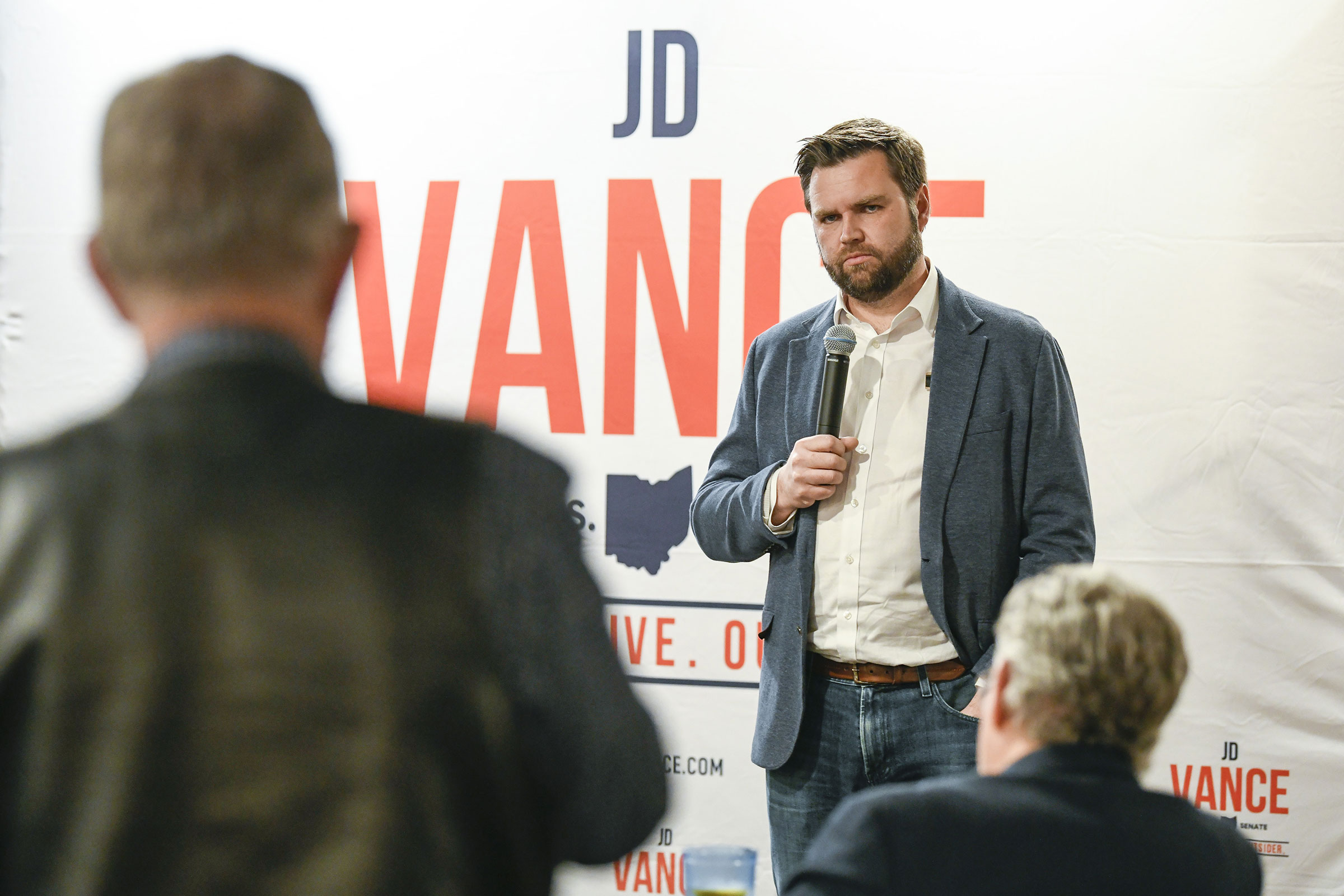
This article is part of The D.C. Brief, TIME’s politics newsletter. Sign up here to get stories like this sent to your inbox.
A funny thing is happening on Ohio’s way to the May 3 primary.
As Ohio Republicans trip over themselves for a last-minute endorsement from former President Donald Trump, they’re rushing in every way imaginable to court the ahistorical wing of the GOP that shares with the former reality star an affinity for distorting facts and ignoring history. In fact, lagging candidate J.D. Vance—yes, that former hedge funder whose memoirs of an Appalachian childhood made him into a star among those looking for a rational explanation of Trump’s power—is now leaning into the idea that the United States’ electoral systems are too cumbersome to be accurate. And, in doing so, he is valorizing an alternate history of this country that had Presidents Al Gore and Hillary Clinton, both of whom won the popular vote but lost the Electoral College. “I have a buddy in France, and they just had an election there. Polls closed a few hours ago and they already know who the winners are. Must be nice to live in a first world country,” Vance tweeted on April 10, referencing France’s presidential election that had its top two finishers in the popular vote advance to an April 24 runoff that will be decided by a simple majority.
Let’s pause for a minute and start at the beginning, dating to the original Constitutional Convention that gave the United States its byzantine and cumbersome Electoral College, the group that every four years convenes to allocate presidential electors based on each state’s population. Giant states with huge numbers of people like Texas and California get a lion’s share of electoral votes, while states with vast land masses but fewer voters like Alaska get just a shrimp’s cut. It ruins the myth that every state’s election matters but preserves the quaint notion that every vote counts equally; otherwise giving Montana and New York the same clout would pervert the system. (Unless you’re in the Senate, where that is, in fact, the case.)
The system is imperfect. No one will credibly say it isn’t. But it neatly divides the states into red ones and blue ones and purple ones. You’d be hard-pressed to see a Democratic presidential candidate chasing votes in Mississippi or Republicans pressing into California once the general election begins—except for donor meetings, of course. The resulting reality is that the Electoral College system reduces a national campaign for President to a handful of swing states, a fact that campaign veterans don’t actually mind because it allows them to triage states. (No Democratic campaign manager on a national campaign has ever prioritized a call with an Idaho supporter over one from Ohio.)
Which brings us back to the Senate race unfolding in spectacularly messy fashion in Ohio. Vance, a potential rockstar recruit for the seat being vacated when Senator Rob Portman retires at the end of this term, chased the history-averse wing of his Republican Party in his errant tweet this weekend comparing election returns in the United States to those unfolding in France. The problem: France elects its leaders by popular vote while the United States elects its leaders by electoral votes. A vote in close states like Michigan, Wisconsin, and, yes, Ohio, matters more than one in South Carolina or Oregon. That means it takes longer to tally our votes, and it also means the way the maps look on election night don’t accurately reflect that actual outcome. Sure, there’s a whole lot of red stretching from Oklahoma City to Raleigh, but all land mass isn’t made equally in politics. And if the raw number of popular votes were determinative, the two most recent Republican Presidents wouldn’t have been seated; George W. Bush and Trump both lost the popular vote.
Vance is flailing in a race that many here in Washington thought was his to lose. The Hillbilly Elegy author was a rural Republican who could tap into vast sums of GOP cash based on narrative and pragmatism. He was once a #NeverTrumper welcomed at the well-heeled donor conference near Palm Springs, Calif., to discuss strategy with billionaires back in 2018—only to admit three years later he was a flip-flopper to TIME’s Molly Ball while eating breakfast in Cincinnati. “I’m not just a flip-flopper, I’m a flip-flop-flipper on Trump,” Vance said, leaning into a strategy that would damn just about any other political aspirant.
But this political moment is one where Republicans are chasing the vestiges of Trump’s power. The ex-President may be dispatched to his Florida club, but he’s plotting his comeback. Most of the Republican Party still sees Trump as the leader and demands fealty to him. And, as such, a whole raft of Republicans in this country are dismissing their own knowledge of how politics works and what history demands to say only what the former President wants to hear. It’s why you have folks like Vance leaning into an ahistorical understanding of American politics while pushing rhetoric that has a distinct whiff of yesteryear’s populist Know Nothings. Not everyone has to understand how elections in France work, but it’s not a tough threshold to have a knowledge of the American system when one is running for a seat in Washington.
Make sense of what matters in Washington. Sign up for the D.C. Brief newsletter.
More Must-Reads from TIME
- Cybersecurity Experts Are Sounding the Alarm on DOGE
- Meet the 2025 Women of the Year
- The Harsh Truth About Disability Inclusion
- Why Do More Young Adults Have Cancer?
- Colman Domingo Leads With Radical Love
- How to Get Better at Doing Things Alone
- Michelle Zauner Stares Down the Darkness
Write to Philip Elliott at philip.elliott@time.com